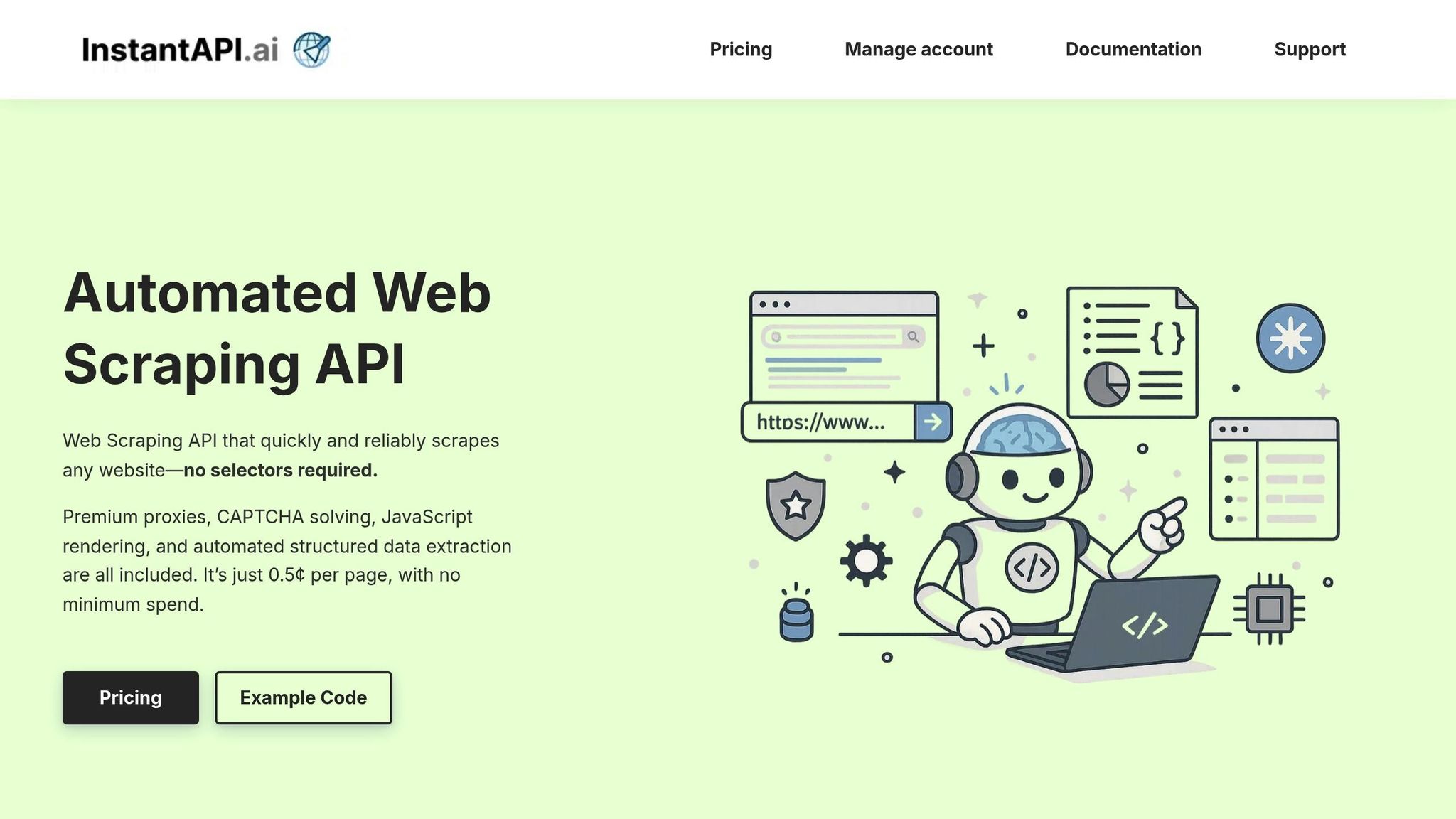Web scraping is transforming the insurance industry by automating data collection and offering actionable insights for risk assessment, pricing, and market analysis. Here's what you need to know:
- Real-time Market Intelligence: Track competitor pricing, product launches, and trends.
- Enhanced Risk Assessment: Use data from public sources like social media and weather patterns for precise policy pricing.
- Customer Insights: Analyze customer behavior through reviews and social media for personalized policies.
- Regulatory Compliance: Stay updated on global regulations like CCPA and EU AI laws.
- Automated Tools: Platforms like InstantAPI.ai simplify data collection with features like geotargeting, JavaScript rendering, and proxy management.
Key Benefits of Web Scraping in Insurance:
- Price Monitoring: Adjust pricing based on competitor data.
- Customer Service: Improve claims processing and response strategies.
- Regulatory Updates: Ensure compliance with changing laws.
Quick Tip: Use tools like InstantAPI.ai for efficient, legal, and accurate data scraping tailored to insurance needs.
How to scrape ALL Farmers Insurance agents and their emails 👀

Web Scraping Uses in Insurance
Insurance companies are leveraging web scraping to turn raw data into insights that guide business decisions. By gathering information from public sources, insurers gain up-to-date knowledge that influences pricing, customer strategies, and regulatory compliance efforts.
Price Monitoring and Market Analysis
Web scraping helps insurers stay competitive by tracking competitor pricing and market strategies. Automatically collecting data on rates, coverage details, promotions, and policy terms allows companies to spot trends, uncover market opportunities, and fine-tune their pricing and product strategies.
| Data Type | Business Application | Impact |
|---|---|---|
| Competitor Rates | Dynamic pricing updates | Aligns with market trends |
| Coverage Features | Product development | Identifies market gaps |
| Marketing Offers | Campaign optimization | Boosts conversion rates |
| Policy Terms | Risk assessment | Improves underwriting |
Customer Data Collection
Web scraping also supports insurers in gathering insights about customers from online sources. This data helps create personalized policies and refine risk assessments. For instance, 74% of insurers now use predictive analytics for underwriting. Additionally, AI chatbots are expected to save the industry $1.3 billion annually by 2030.
"AI uses technologies such as machine learning and data analytics to enhance underwriting, claims processing, customer service, and risk assessment." - Aleksandr Sheremeta, Managing Partner
Industry Updates and Compliance
Staying on top of regulatory changes is crucial for insurers. Web scraping allows companies to monitor updates across regions, ensuring compliance while spotting new opportunities. For example, the European Union's proposed Artificial Intelligence Act categorizes AI systems by risk, while U.S. laws like California's Consumer Privacy Act (CCPA) influence how consumer data is handled.
To ensure compliance, insurers should:
- Establish clear data governance policies: Define how data is used and retained.
- Track regulatory changes regularly: Stay informed about updates in key jurisdictions.
- Maintain data accuracy: Use reliable tools to extract precise information.
- Be transparent: Clearly document how data is collected and used.
The growing focus on data-driven strategies is evident in the global usage-based insurance market, which is projected to reach $96.4 billion by 2026.
Web Scraping Methods and Tools
Modern insurance companies need efficient tools to gather market intelligence. These tools work alongside other strategies to streamline data extraction from global sources.
Getting Started with InstantAPI.ai

InstantAPI.ai offers advanced web scraping designed specifically for extracting insurance data.
Here’s how its features support insurance data collection:
| Feature | Use Case | Business Advantage |
|---|---|---|
| Worldwide Geotargeting | Collect data from over 195 countries | Analyze regional markets |
| Custom Data Output | Define JSON schemas to fit your needs | Simplify data processing |
| JavaScript Rendering | Capture full page content | Access complete policy details |
| Automatic Proxy Management | Over 65 million rotating IPs | Ensure reliable data access |
Overcoming Common Technical Challenges
Insurance websites often have strict security measures in place. InstantAPI.ai tackles these challenges with automated solutions:
- Mimics human-like behavior to bypass CAPTCHAs
- Uses headless Chromium for full page rendering
- Employs premium residential proxies for consistent data collection
"After trying other options, we were won over by the simplicity of InstantAPI.ai's Web Scraping API. It's fast, easy, and allows us to focus on what matters most - our core features." - Juan, Scalista GmbH
Benefits of API Data Collection
With a cost of $0.005 per page scrape, InstantAPI.ai allows companies to scale data collection without upfront investment. Its pay-per-use pricing delivers enterprise-level capabilities at an accessible cost.
Key advantages include:
- Extracting detailed policy information and pricing
- Keeping up with regulatory updates across regions
- Tracking market trends with automated data collection
- Transforming raw data into structured insights
The platform’s intelligent data population system ensures the information you gather is accurate and tailored to your needs, letting you focus on analysis instead of technical hurdles.
sbb-itb-f2fbbd7
Data Rules and Quality Standards
Insurance web scraping must adhere to strict legal and quality guidelines to ensure compliance, accuracy, and ethical use of data. These rules go hand-in-hand with the technical strategies mentioned earlier, focusing on legal obligations and maintaining data precision.
Legal Requirements
When gathering insurance data through web scraping, following U.S. regulations is critical. These laws govern how data is collected and used, ensuring both compliance and ethical practices.
Key areas to focus on include:
| Regulation | Scope | Requirements |
|---|---|---|
| HIPAA | Health Insurance Data | Encrypt and secure protected health information |
| CFAA | Computer Access | Authorization required for accessing non-public data |
| Copyright Laws | Content Protection | Respect content ownership and fair use limits |
| State Privacy Laws | Regional Requirements | Comply with state-specific data collection rules |
The U.S. 9th Circuit Court of Appeals has clarified that scraping publicly available data does not violate the Computer Fraud and Abuse Act. However, accessing private or login-protected insurance data requires explicit authorization.
Data Quality Control
Legal compliance is only part of the equation - ensuring the integrity of the data is just as important. High-quality data is essential for accurate risk assessments and pricing decisions.
Here are some best practices for maintaining data quality:
- Automated Validation: Implement tools to check data completeness and format consistency.
- Source Verification: Ensure all data comes from authorized and trustworthy sources.
- Regular Updates: Set up consistent refresh cycles to keep data current.
Organizations should also maintain detailed audit trails of their data collection and processing activities. This helps demonstrate compliance with regulations and ensures transparency. Insurance companies must account for rate filing requirements, policy documentation standards, claims data accuracy, and market conduct examination rules. Regular quality reviews can catch potential problems early, keeping the data reliable and aligned with both regulatory and business needs.
Web Scraping Setup Guide
A well-thought-out web scraping setup helps maximize the value of collected data while staying compliant with regulations. Below are practical techniques that build on API-driven data collection methods, offering insurers a way to enhance risk assessment and market analysis.
Risk Assessment Data Collection
For insurers, collecting diverse data is crucial for accurate risk evaluation. Automated systems can help gather critical information like:
| Data Type | Source | Business Impact |
|---|---|---|
| Property Records | County Databases | More accurate property valuations |
| Weather Patterns | Climate Databases | Better natural disaster modeling |
| Social Media | Public Profiles | Improved fraud detection |
| Public Records | Government Sites | Faster verification processes |
Set up your scraping tools to focus on key data points. Use automated scheduling during off-peak hours and reliable API endpoints to ensure stable connections and reduce errors.
Price Setting and Product Design
Real-time market insights are essential for data-driven pricing strategies. Web scraping can help insurers monitor:
- Competitor rate changes
- Customer feedback on products
- Emerging market trends
- Regional risk factors
By analyzing these data points, companies can quickly adjust pricing models and fine-tune product designs. Automated alerts and regular updates ensure decisions are based on the most current information.
Customer Service Improvements
Web scraping can also improve customer service operations by gathering targeted data. Here are some examples:
| Customer Data Point | Application | Expected Benefit |
|---|---|---|
| Service Reviews | Identifying common issues | More effective response strategies |
| FAQ Searches | Enhancing self-service tools | Better platform usability |
| Claim Patterns | Streamlining processes | Faster claim resolutions |
Focus only on publicly available customer data to ensure privacy compliance. Use clear parsing rules to extract meaningful insights, like sentiment indicators, and integrate this data with CRM platforms. This allows for real-time updates and automated responses, keeping customer insights accurate and actionable.
Conclusion: Making Web Scraping Work
Web scraping has become a game-changer for insurance companies, simplifying data collection and powering smarter decisions. Tools like InstantAPI.ai make it easier to gather market data efficiently and accurately.
With its broad global reach and budget-friendly pricing, the platform helps insurance providers scale their data collection efforts without sacrificing quality. Its advanced API tools handle the heavy lifting of complex data tasks, freeing up teams to focus on analyzing insights rather than managing technical details.
This approach boosts market analysis, improves risk evaluation, supports compliance, and uncovers customer trends. By offering customizable outputs and global targeting, companies can ensure they’re collecting the most relevant data for their unique goals - all while keeping operations smooth and efficient.
FAQs
How can web scraping help insurance companies enhance risk evaluation and pricing strategies?
Web scraping empowers insurance companies by providing real-time data to refine risk evaluation and pricing strategies. By gathering insights such as competitor pricing, customer demographics, and emerging market trends, insurers can make more informed decisions and stay competitive.
With web scraping, companies can monitor market changes, analyze competitor offerings, and identify new opportunities. This data-driven approach supports more accurate risk assessments, personalized pricing, and improved customer targeting, ensuring businesses remain adaptable in a constantly evolving industry landscape.
What legal factors should insurance companies consider when using web scraping to gather data?
Insurance companies must carefully navigate several legal considerations when using web scraping for data collection. Key factors include adhering to website terms of service, respecting robots.txt directives, and complying with data privacy laws such as the GDPR or CCPA. It's essential to focus only on publicly available data and avoid collecting personal information without explicit consent.
Additionally, companies should prioritize data security measures to protect the information they gather and ensure their scraping practices are transparent and ethical. Consulting legal experts familiar with web scraping laws can help minimize risks and maintain compliance.
How does InstantAPI.ai ensure accurate and compliant data collection for the insurance industry?
InstantAPI.ai prioritizes data quality and regulatory compliance by combining advanced AI-driven tools with robust safeguards. Our platform ensures that all data collected is accurate, up-to-date, and relevant to the insurance industry’s specific needs, such as analyzing competitor pricing or identifying emerging market trends.
Compliance is at the core of our approach. InstantAPI.ai adheres to data protection laws and industry regulations, minimizing risks associated with web scraping. By implementing ethical data-gathering practices and offering customizable solutions, we help insurance companies access valuable insights while staying compliant with applicable laws and standards.


